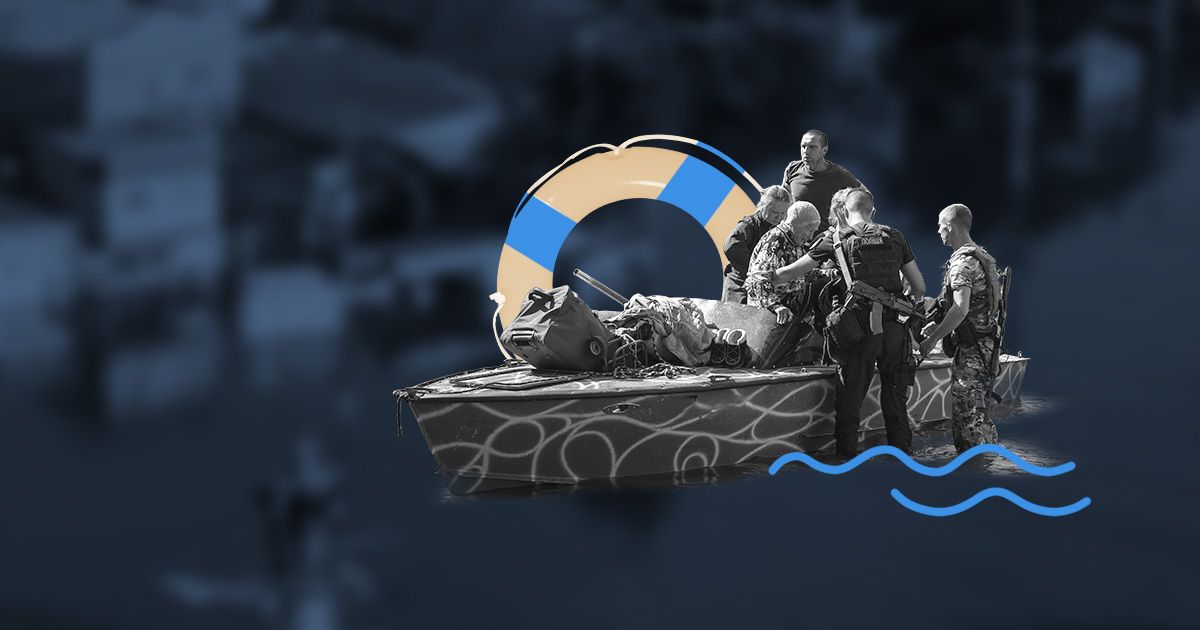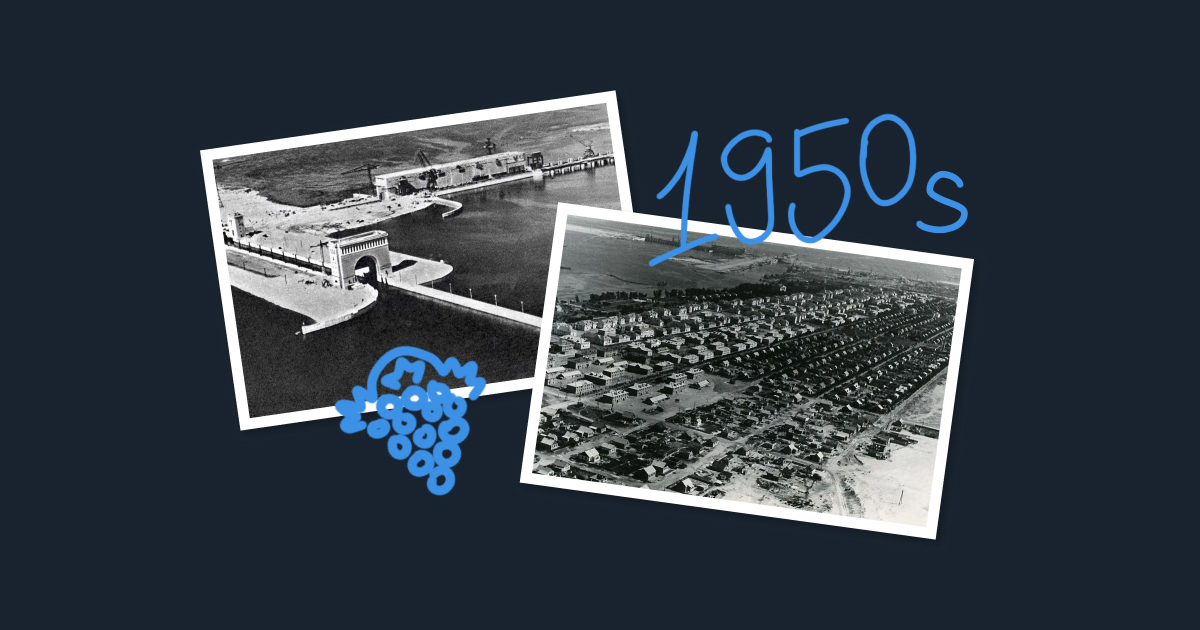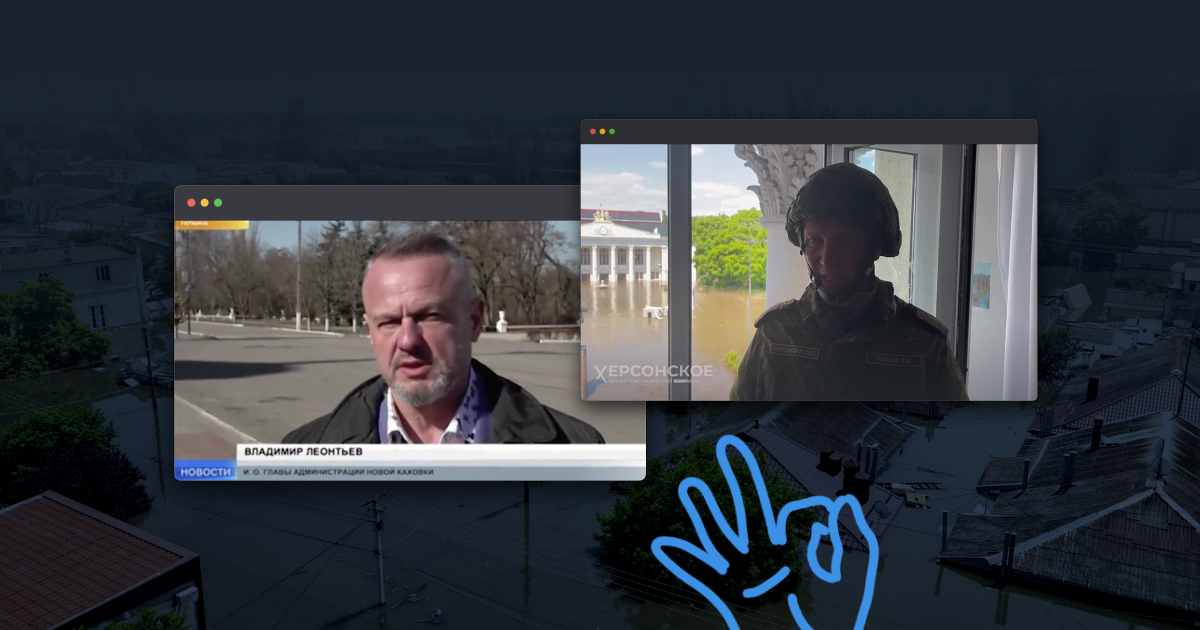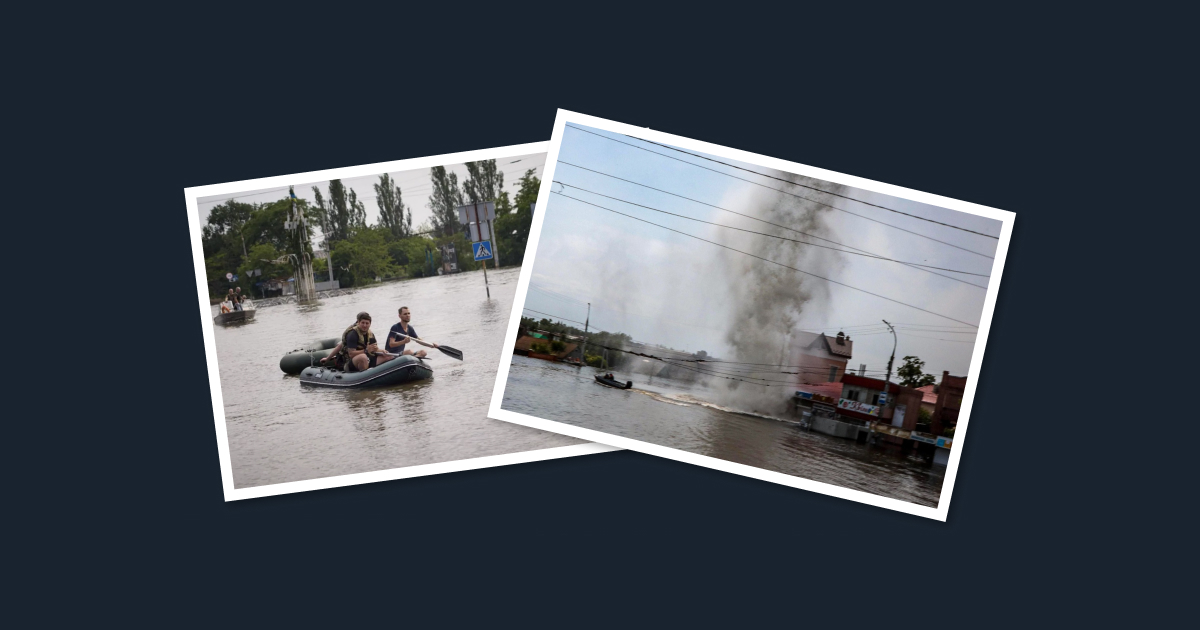"Half of the Kherson region has been drowned, the other half will die of drought." The story of a volunteer who helps people in the occupation

Stefan Vorontsov is a volunteer and coordinator of the Humanity organisation from Nova Kakhovka. Since the beginning of the full-scale invasion, the organisation has been helping people in the temporarily occupied Kherson region with evacuation and humanitarian and financial aid. Vorontsov spent more than a month under occupation, then left in fear for his safety, and now coordinates the activities of volunteers remotely.
After the explosion of the Kakhovka HPP, the Russians evacuated only those with Russian passports. On June 11, Kherson Governor reported that three people evacuating from the temporarily occupied left bank were killed by the Russian shelling of a boat. Ten people were wounded. More than 100 civilians were evacuated to the right bank of the Dnipro River.
The Russian army is occupying civilian homes and setting up defensive positions there. There is no drinking water in the non-flooded areas of the left bank, and the population serves as a human shield for the Russian military.
Read about the humanitarian situation in the occupied territory, the measures taken by the Russians, and the activities of volunteers in the article. Next is Stefan Vorontsov's direct speech.
The HPP Explosion: Background
In the first weeks of the invasion, there was little news about Nova Kakhovka and the left bank. The Kyiv and Chernihiv regions were under occupation, so there was no time for us. And I feel it had been no time for us until the Russians blew up the hydroelectric power plant.
Nova Kakhovka was built specifically for the hydroelectric power plant. The locals understood that the biggest threat to us was if the dam was blown up. There was fear, but it was scarier for us just to go outside.
There are maps in the public domain, which, at the construction stage, showed which areas would be flooded if the plant were to be destroyed. Almost everything turned out to be true. Even 70 years ago, it was known who would be flooded first and who would not.
Despite the fact that last autumn, Ukraine reported that the HPP was mined, people crossed that bridge when they got there. Talking about problems is not the same as offering solutions. Everyone knew it could be blown up, but even in Kherson, not enough boats were prepared.
Now they have started to insist that people leave Enerhodar. Asking to leave to save your life is not the same as saying that you will be protected and you have a place to go. Leaving your home means giving it to the Russians and going into the unknown.

The HPP Explosion: Reaction
There were no rumours the day before. The explosion of the HPP came as a shock to everyone, especially to the Russians. They were sitting on the trees and couldn't even swim: the current was so strong that it was carrying them away. The explosions from the hydroelectric power plant were heard for about an hour — the plant was blown up, and then the explosives were detonating for some time.
At first, the occupation "authorities" denied it. Videos of the explosion were already circulating online, and the so-called 'mayor' of Nova Kakhovka [Vladimir] Leontyev came out and said that everything was fine, nothing had exploded. Then [the so-called "acting governor of the Kherson region" [Vladimir] Saldo made a video with the Palace of Culture in the background, with the first floor already flooded, and said that everything was fine.
Half a day passed, and they started blaming the Armed Forces. Propaganda reporters arrived. They couldn't find people in Nova Kakhovka who would say on camera that "the khokhols [ethnic slur Russians use for Ukrainians — TN] attacked with HIMARS."
On the third day, the first photos and videos appeared, showing the Russian Ministry of Emergency Situations allegedly doing something. The number of the service was posted at the same time. More precisely, people simply found it themselves, and then the Russians posted it to confirm its relevance and "officialness."
"Help" from Russia
There was no evacuation for a long time. We were waiting for them to arrange something, because we also wanted to evacuate people. Temporary accommodation centres were set up on the fourth day in [temporarily occupied] Skadovsk and Zaliznyi Port.
In [temporarily occupied] Oleshky, there is a school and a hospital where people are accommodated. There is no access to them. The worst thing is that there is no food. There were three shops in Oleshky: everything was either sold out or stolen, and the Russians are not importing anything.
The so-called 'authorities' can organise water distribution points in Henichesk or Skadovsk. But there are many more villages, and they don't bring water there. There is no organised distribution of aid to people, and there has never beem. It is done only on camera.
The Ministry of Emergency Situations also evacuates people only on camera. Civilians are screaming from the rooftops, asking for help, and they are passing by to reach specific people. I don't know how common this story is, but Russians knew exactly where the collaborators, people tolerant of them, and those who had Russian passports lived (on June 10, the General Staff of the Armed Forces of Ukraine reported that the Russian military allowed only people with Russian passports to evacuate from the flooded settlements — ed.)
It is impossible to pass through the checkpoint without a Russian passport. The occupation "authorities" are afraid of saboteurs. People come to us saying that a relative of them has left, and they don't know where. Russians take away SIM cards, possibly documents. We can be contacted by those with whom they keep in touch. We can help them get through Russia to Europe for free.

The South is Dying
The flooding started at three in the morning. We know that those who were on the islands in the centre of the Dnipro drowned. They could not get to the surface of the water. If they did, they were swept away by the strong current. People on boats also turned over and drowned.
Locals die of diseases. Even if people dependent on medication got out of the house, all the medication was flooded away. They die from blood pressure, stress, and high temperatures. They faint in the sun and fall into the water. Many bodies are floating on the river: children, the elderly, and animals.
Desperate people are trying to swim across from the right bank to evacuate people — Russians shoot them. There were cases when Russians submitted requests for evacuation in rescue chats. They wrote that the situation was critical, that they needed help, that there were children, and volunteers came to that place, and then they were killed.
Now the attention is more focused on Oleshky and the flooded settlements, because there is kind of a stalemate there. In the non-flooded rear, the situation on the left bank is exponentially worse. There is no drinking water. In Crimea, there are still reserves accumulated over a year and a half [of the full-scale invasion]. This water is not used for the Kherson region. The countdown for thousands of civilians has begun.
Human Shield
If they wanted, the Russians could have evacuated everyone on the first day. Ukraine would easily facilitate the creation of the green corridor. But the locals are used as a shield before the Ukrainian army's offensive. Due to the flooding, the Russian army now has no fortifications nor first line of defence — only civilians to hide behind. Houses have become the first line of defence, and they will fire from them. Positions are set up on the roofs and in rooms.
Locals are being kicked out of their homes. Russians are open about the fact that they don't care where people go. They do not let people leave the settlements because civilians are a cover.
There is information that passports are being taken away from people in accommodation centres so that they cannot leave. This is unconfirmed, we want to contact these centres, but there is no signal and no electricity. We have not yet confirmed a single case where someone has left the accommodation centres in Oleshky and reported it.
Evacuation
You can't just get on a boat and go save people. It's impossible to evacuate anyone from Oleshky (already after the conversation with Stefan, Kherson Governor Oleksandr Prokudin said that Ukraine had managed to evacuate some people from the temporarily occupied left bank — ed.)
The only thing we are doing is collecting data from people who need to evacuate and they are no longer on the roofs. Those on the roofs are added to another group chat, where they process this data and add locations to the map. It's also impossible to get to Hola Prystan, they don't let you through at the checkpoint.
The Russians have been taking away local boats. There are cases when boats were taken away at checkpoints. The Russians need to escape somehow, and they will not be punished for taking someone's boat.
There have already been reports that locals are being let through the checkpoints for money. Russia can now really "sell" people. We are preparing for this, and if we find out it is possible, we will do it unofficially. It's absurd to even think that we will be able to buy our people back.
The only thing we have now is an initiative of the locals from Oleshky, who organise teams with boats to take people off the roofs. They have agreed with those at the checkpoint that they would take the locals by bus through Skadovsk to Crimea.
The joint pressure on Russia is working. They can't ignore the pressure. Propaganda calls these people "theirs." They can put pressure and say: "Please let the bus pass. You will know where everyone is going. Just let them be rescued." Crimean volunteers are trying to talk and negotiate. They are now doing more than the UN and all other organisations.
You can leave the [occupied] left bank of the [Kherson] region for Crimea with the Helping to Leave organisation. They buy tickets and organise online escort. Although Crimea is a bit paralysed right now — too many people want to leave and are queuing up. We are trying to warn that there will be filtering and provocations, especially against men. The problem is also with the transport operators — it's not the same as ordering an Uber. This person takes a risk, and it's not a given that they will let them through. Russians are not helping.
We, as an organisation, can help people from all the non-flooded areas of the left bank to leave through Crimea or Russian territory and return to Ukraine through Kolotylivka, a checkpoint between the Sumy and Belgorod regions, where there is a two-kilometre grey zone. This is a terrible road that goes through occupied Melitopol and Mariupol, and then either Donetsk or Luhansk, or through Rostov and along Russia ['s border regions].
People can find transport, negotiate with those who have cars. There are regular departure points — Nova Kakhovka, Kakhovka, Skadovsk, and Melitopol — and people can find taxis from their own towns. We are ready to pay for this so that hopefully the residents of the [occupied part of] Kherson region evacuate.
No one from international organisations or Ukrainian institutions has contacted us. The United Nations and the International Committee of the Red Cross proved themselves to be worthless a long time ago. I don't know why we are scaring and tagging them if they have done nothing in the year and a half [of the full-scale invasion]. Do we hope that they will do something now? No, we don't. Russia still has a vote in the UN, and here is their vote: half of the Kherson region has been drowned, and the other half will die from drought and bad water.

Humanitarian aid
Since September 2022, humanitarian aid has not been allowed to be brought in from the Ukrainian-controlled areas. Our last journey to evacuate people was leaving then. When we entered the temporarily occupied territories from Ukraine, Russians threw all the humanitarian aid to the side of the road and made it clear that we would not bring anything in without documents: "This is some kind of goods, you will be selling it somewhere."
Then they held a "referendum" and imagined themselves as Russia here. Evacuation was also banned at the same time — only with passes. The pass is a Russian passport. "Humanity" finds the money to buy humanitarian aid on the spot, looks for transport operators, and pays for the evacuation of people.
We are providing humanitarian aid to the Kakhovka district (Kakhovka, Nova Kakhovka, and about ten surrounding villages) and the Henichesk district (Ivanivka and ten villages). There are many people left there, and we try to keep in touch with them. For example, once a week, someone used to go to Kakhovka. There are stores there, where loyal people work. Locals can leave a request, we buy the goods and distribute them. Sometimes we bring goods from Crimea, but less often because it is more difficult to pass checkpoints with humanitarian aid.
Yesterday [June 10] we managed to deliver five thousand litres of water. People were quietly asking us who the aid was from, because they didn't want to take Russian aid. When they found out that it was from Ukraine, they hugged the bottle, cried, and thanked us.
"Humanity" raises funds for its activities on Twitter. Now we have about 10 thousand dollars and are looking for ways to use them to help those under occupation. So far, the organisation has enough money, so I urge you to donate to the army to speed up the counter-offensive and liberation of Ukrainian territories.


